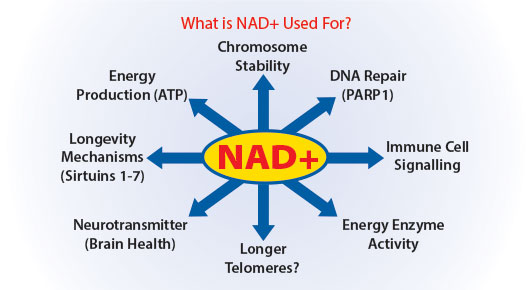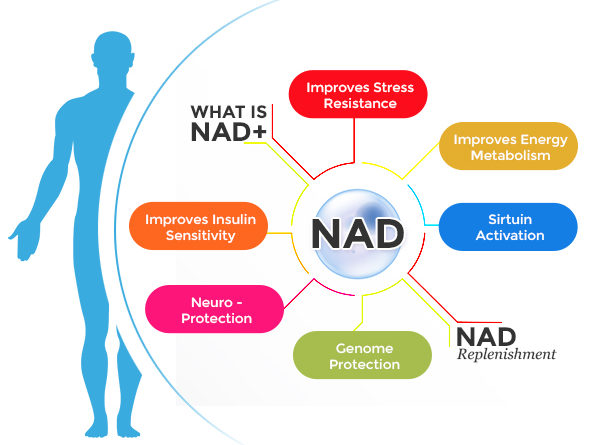Reversing the Clock: NAD+ Supplementation and Groundbreaking Gene Therapy to Combat Aging
Nicotinamide riboside (NR) and nicotinamide mononucleotide (NMN) are precursors to nicotinamide adenine dinucleotide (NAD+), a coenzyme essential for energy metabolism, DNA repair, and cellular aging. Dr. David Sinclair’s research focuses on boosting NAD+ levels to promote healthy aging and potentially extend lifespan. Sinclair’s recent study demonstrated reversing aging effects in mice using gene therapy. Combining this with NAD+ supplementation could enhance the effects of gene therapy, but more research is needed to determine the effectiveness and safety in humans. Foods like dairy products, fish, lean meats, whole grains, and legumes can help support NAD+ production in the body.

Nicotinamide riboside (NR) and nicotinamide mononucleotide (NMN) are both precursors to nicotinamide adenine dinucleotide (NAD+), a coenzyme found in all living cells that plays a critical role in energy metabolism, DNA repair, and cellular aging. Both NR and NMN have gained attention as potential supplements for improving health and longevity.
While Dr. David Sinclair, a renowned scientist in the field of aging and longevity, prefers NMN for its potential anti-aging benefits, the comparison between NR and NMN is still a topic of ongoing research. Some studies suggest that NMN may have advantages over NR in terms of bioavailability and cellular uptake, but more research is needed to make definitive conclusions.
It is important to note that individual responses to these supplements may vary, and the effectiveness of either NR or NMN could depend on factors such as genetics, diet, and lifestyle. As with any supplement, it’s crucial to consult with a healthcare professional before starting a supplementation regimen.
Latest Findings from Dr Sinclair and NAD+
Dr. David Sinclair and his team have demonstrated the potential to reverse the effects of aging and restore youthful biological signs in mice, as described in their Cell paper. This research supports Sinclair’s Information Theory of Aging, suggesting that aging results from lost cellular information, not merely the accumulation of damage.
In their experiments, researchers used a gene therapy involving three genes (from the Yamanaka stem cell factors) that instructed cells to reprogram themselves. By doing so, they turned back the clock by about 57%, making the mice youthful again. This breakthrough has implications for treating age-related diseases and conditions.
One of the key molecules involved in aging is NAD+ (nicotinamide adenine dinucleotide), a coenzyme that plays a critical role in energy metabolism, DNA repair, and cellular aging. NAD+ levels naturally decline with age, and Dr. Sinclair’s research has been focused on understanding ways to boost NAD+ levels in the body to promote healthy aging and potentially extend lifespan. Two popular NAD+ precursors that have been studied in this context are nicotinamide riboside (NR) and nicotinamide mononucleotide (NMN).
By combining the findings from the Cell paper with the understanding of NAD+’s role in aging, it is possible that future research could explore the potential synergistic effects of gene therapy and NAD+ supplementation. This could involve investigating whether boosting NAD+ levels with precursors like NR or NMN could enhance the effects of the gene therapy that reprograms cells and reverses the aging process. Such research could lead to more effective treatments for age-related diseases and conditions, as well as contribute to a deeper understanding of the underlying mechanisms of aging.
However, it’s essential to note that more research is needed to conclusively determine the effectiveness and safety of both the gene therapy and NAD+ precursor supplementation in humans. As the field of aging research progresses, it will be crucial to explore these potential connections and their implications for human health and longevity.
How to increase NAD+ levels
While more research is needed to fully understand the potential benefits of NR (nicotinamide riboside) and NMN (nicotinamide mononucleotide) supplementation, some studies suggest these NAD+ precursors may provide the following benefits:
- Improved cellular health and aging: By increasing NAD+ levels, NR and NMN may help counteract the natural decline of NAD+ that occurs with age. This can support cellular health, enhance DNA repair, and improve mitochondrial function, which could contribute to healthier aging.
- Enhanced energy metabolism: NAD+ plays a crucial role in energy metabolism within cells. By boosting NAD+ levels, NR and NMN supplementation may improve overall energy production and support better metabolic function.
- Support for cognitive health: NAD+ is essential for maintaining proper brain function. Some studies suggest that NR and NMN supplementation may support cognitive health by promoting neurogenesis, protecting neurons from damage, and enhancing communication between brain cells.

While there are no direct food sources of NR (nicotinamide riboside) or NMN (nicotinamide mononucleotide), you can consume foods rich in precursors and related compounds that support NAD+ production in the body. Here are three such foods:
- Dairy products: Milk, especially cow’s milk, contains nicotinamide riboside (NR) and other compounds that can help support NAD+ production. Consuming dairy products like milk, yogurt, and cheese may contribute to maintaining healthy NAD+ levels.
- Fish and lean meats: These protein-rich foods are good sources of niacin (vitamin B3), which is another precursor to NAD+. Fish such as salmon, tuna, and sardines, as well as lean meats like chicken and turkey, can help support NAD+ production in the body.
- Whole grains and legumes: Whole grains (e.g., brown rice, quinoa, and whole wheat) and legumes (e.g., lentils, chickpeas, and black beans) are rich in niacin and other B vitamins that play a role in NAD+ synthesis. Incorporating these foods into your diet may help support healthy NAD+ levels.
In addition to these specific foods, maintaining a balanced diet rich in fruits, vegetables, whole grains, lean proteins, and healthy fats can promote overall health and support the body’s natural production of NAD+.
The Verdict
In summary, while Dr. Sinclair favors NMN, more research is needed to determine the superiority of either NR or NMN definitively. Until more conclusive evidence is available, it is difficult to say which is better for enhancing health and longevity in general.
References

I’m the co-founder of Evidently Healthy, the resident biohacker and a marketer’s dream. As someone who believes you can’t put a price on health. I’m passionate about improving lifespan and health span. In my spare time I enjoy traveling, snowboarding, diving, podcasts, exercise and eating in and out. #Coffee-Lover Rating global coffee bean for years..
